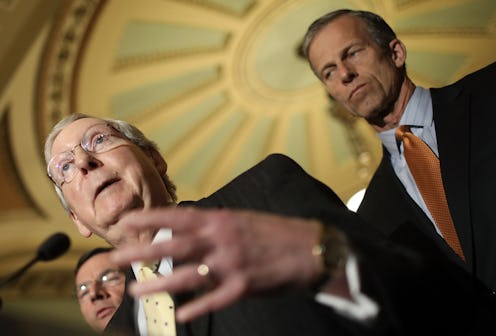News
Is The GOP Health Care Bill Just Delayed Or Doomed?

In a setback to Republican leaders determined to deliver a fatal blow to the Affordable Care Act before July 4, Senate Republicans delayed an Obamacare repeal vote scheduled for this week after it became clear the proposed legislation lacked the support to pass. In the days since the Senate's draft health care legislation was unveiled, the proposal has taken fire from both conservative and moderate Republican lawmakers, posing a challenge for Senate Majority Leader Mitch McConnell. Now that the vote has officially been delayed, experts on both sides of the aisle are watching closely to see how the GOP handles this legislative setback, and who takes the blame.
"I think the fact that they don't have the votes to proceed is an admission that there's a major disconnect between the administration and the Senate leadership," says democratic strategist Patrick Murphy. The Trump White House has been lobbying Republicans to vote in favor of the bill, and President Trump extended an invitation to all Senate Republicans for a meeting at the White House Tuesday afternoon.
"Republican members of Congress, both the Senate and the House, do not want to walk the plank for Donald Trump."
Trump's pledge to repeal and replace Obamacare was a cornerstone of his presidential campaign, continuing a seven-year Republican mantra that brought the party control over all three branches of government. But Republicans have yet to coalesce around a plan that pleases its most conservative leaders, who want a full repeal of President Obama's signature health care law, and moderate Republicans, whose voters depend on an expanded Medicaid program thanks to Obamacare.
"Increasingly, Republican members of Congress, both the Senate and the House, do not want to walk the plank for Donald Trump," democratic strategist Karen Finney says. "They recognize he is not going to be able to help them in the midterms... They don't think they'll be able to trust him because he's so erratic on so many things."
With re-election looming in 2018, Nevada Republican Sen. Dean Heller is navigating a rock-and-a-hard-place dilemma: buck the party and risk facing a primary challenger next November, or vote "yes" on the plan and risk losing voter support. “I cannot support a piece of legislation that takes insurance away from tens of millions of Americans," Heller said, acknowledging he's "not confident" the bill will lower health care costs in his home state.
"I think Republicans are just taking a breath and making sure they get this right."
According to the Associated Press, Trump softened his typical all-or-nothing approach to whipping votes in support of the health care bill, telling Senators if it fails, he won't like it "and that's OK."
"I think this falls squarely on the shoulders of Mitch McConnell," says Oz Sultan, a Republican pundit. "Trump's job really is to provide leadership and direction. Congress' job is to provide the actual, actionable legislation to facilitate this," Sultan says.
Others stood behind McConnell's proven ability to whip the necessary votes. "I wouldn't count McConnell out yet," Sen. Richard Shelby told CNN.
"I think it's the Republican Senators saying to Mitch McConnell and saying to Donald Trump, 'you do not understand the world in which we live,'" Murphy says. "When you have the House, the Senate, and the White House, it should be pretty smooth, but it's not."
The day the health care bill was unveiled, four conservative Senators said they could not support it in its current form. On Monday evening, moderate Maine Senator Susan Collins tweeted that she would not support a motion to proceed with debate on the bill. By lunchtime Tuesday, a handful of Senators had joined the chorus.
Nicole McCleskey, a partner at Public Opinion Strategies, a prominent Republican polling firm, tells Bustle the GOP's move to step back and rework the draft legislation "is a great opportunity for us to create a very good Republican alternative."
"I think Republicans are just taking a breath and making sure they get this right," McCleskey says. "It's been wrong for too long and there's tremendous recognition across the caucus that it needs to be fixed and done in the right way for the long term."
Republican senators from states that chose to expand Medicaid under Obamacare have pushed for federal funding cuts to be phased out more gradually than the current bill mandates. At least one Senator from a state ravaged by opioid addiction has pledged to withhold support unless dollars to combat the crisis are doled out.
"If they don't pass this, they're going to lose their base. If they do get it done, they're going to lose the rest of the country."
"This is a setback, but its not a defeat yet," says Zac Petkanas, a democratic strategist who headed the Trump Rapid Response operation in Hillary Clinton's campaign. "There's a long road ahead for this bill. One of the key things that we should be watching now is the $300 billion plus in deficit savings that C.B.O. identified. That is a slush fund that Mitch [McConnell] will be dolling out to Senators to get their vote."
Earlier Tuesday, the Congressional Budget Office estimated a loss of insurance for 22 million people over 10 years if the plan were implemented. Meanwhile, public support for the Affordable Care Act is at an all-time high, with 51 percent of Americans reporting a positive view of Obamacare.
"The only thing the administration can do is double down. They put so much of their political capital into this legislation," Petkanas says. "If they don't pass this, they're going to lose their base. If they do get it done, they're going to lose the rest of the country."